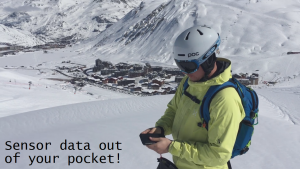 The Center for Ubiquitous Computing has joined project S3- Simple Smart Sensor, financed by TEKES’ “New knowledge and Business from Research Ideas Programme – TUTLI” 2017 call.
The Center for Ubiquitous Computing has joined project S3- Simple Smart Sensor, financed by TEKES’ “New knowledge and Business from Research Ideas Programme – TUTLI” 2017 call.
Nowadays, people are concerned and curious about the conditions of their surrounding environment. As an example, people are seeking for more information about their indoor air quality in order to improve their health and wellbeing. At the moment, users do not have the possibility to obtain information with their smartphones and tablets directly due to the lack of sensors on their portable devices.
We invented a sensor card which enables new, external sensors for smartphones and tablets. Our invention transmits data from external sensors wirelessly to the device of the user. The information is displayed on the portable device and the data can then be processed further by any mobile application running on the device. Data can also be shared online in a simple way with other users.
With the help of our invention users are capable of collecting sensor data which they cannot obtain otherwise. Our sensor card turns smartphones and tablets into measurement instruments. Users will be able to analyse their surrounding environment in new ways and new dimensions and, most important, obtain the information they want and need.
The developed sensor card has the size of a credit card. Thus, users can easily carry the sensor card with them in their pockets. As an example, the sensor card can be stored in the flip wallet of smartphones. Whenever needed, users can collect sensor data instantaneously, for example the current temperature and humidity level, available amount of ambient light and UV radiation, to name a few.
Our invention represents a competitive solution, featuring a number of competitive advantages. Our sensor card works with the help of near field communication and, thus, does not require any battery or other type of power source. In addition, due to low manufacturing costs, we are able to provide more and different types of sensors for users. Currently, we have a fully working prototype which can also serve as demonstration system. The aim of this project is to turn this prototype into a commercial device and, thus, bring the invention into the hands of smartphone and tablet users.
Project S3 will run from July 1st 2017 till December 2018, under the coordination of CAS and in association with partners OPEM, WATER and UBICOMP. Adj. Prof. Denzil Ferreira leads UBICOMP’s involvement in the project.

